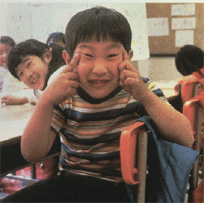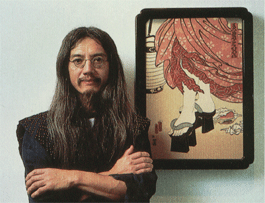Foreign Workers
 There are 1 million
or so foreign residents in Japan (excluding over 600,000 Koreans). Many Taiwanese
emigrated to Japan searching for higher living standards and jobs, most of them
making their homes in the Kansai plain, with secondary Taiwanese communities
in northern Kyushu and Tokyo. Chinese residents or zainichi chugokujin
are also resident in Japan and can have great difficulties in being considered
legal citizens of Japan. The Far Easterner Slavs, living in their compact communities
in Karafuto and Hokkaido, also contribute to the pluriethnicity in Japan as
do Filipino and other Asian expatriate communities in Tokyo. Other foreign workers
were attracted to Japan in the economic boom of the 1980s and came from China,
Bangladesh, Pakistan and Iran.
There are 1 million
or so foreign residents in Japan (excluding over 600,000 Koreans). Many Taiwanese
emigrated to Japan searching for higher living standards and jobs, most of them
making their homes in the Kansai plain, with secondary Taiwanese communities
in northern Kyushu and Tokyo. Chinese residents or zainichi chugokujin
are also resident in Japan and can have great difficulties in being considered
legal citizens of Japan. The Far Easterner Slavs, living in their compact communities
in Karafuto and Hokkaido, also contribute to the pluriethnicity in Japan as
do Filipino and other Asian expatriate communities in Tokyo. Other foreign workers
were attracted to Japan in the economic boom of the 1980s and came from China,
Bangladesh, Pakistan and Iran.
 The plight of foreign
workers in Japan is such that they are hired to do the jobs no one else wants
to do, the so-called 3-K jobs: kitsui (difficult or hard), kiken
(dangerous), and kitanai (dirty). All too often they are at the mercy
of employers who have anything but their best interests at heart. As a foreigner
even if you are naturalised you have no recourse against discrimination. Instances
are know of being excluded even from entering certain shops and restaurants.
The plight of foreign
workers in Japan is such that they are hired to do the jobs no one else wants
to do, the so-called 3-K jobs: kitsui (difficult or hard), kiken
(dangerous), and kitanai (dirty). All too often they are at the mercy
of employers who have anything but their best interests at heart. As a foreigner
even if you are naturalised you have no recourse against discrimination. Instances
are know of being excluded even from entering certain shops and restaurants.
Foreign workers have been viewed as a potential danger to Japanese society
and associated with criminal activities. The public is quite willing to inform
the police of any suspicious activties, yet at the same time businesses will
employ them at low rates of pay. Read Wolfgang Herbert's book called Foreign
Workers and Law Enforcement in Japan for more details.
 Europeans living
in Japan have similar acceptance problems, but less so. Marutei Tsurunen, for
example, a naturalized Japanese citizen born in Finland, who in July 2001 became
the first Westerner to be a Japanese lawmaker representing the Democratic Party
in the House of Councillors (upper house of the Japanese Parliament).
Europeans living
in Japan have similar acceptance problems, but less so. Marutei Tsurunen, for
example, a naturalized Japanese citizen born in Finland, who in July 2001 became
the first Westerner to be a Japanese lawmaker representing the Democratic Party
in the House of Councillors (upper house of the Japanese Parliament).
Returnees
 These include Brazilians
and Americans who are descendants of Japanese migrants who had sought opportunity
in South and North America earlier in the 20th century. Although ethnically
Japanese, they can be distinguished as returnees from the way they dress or
act. Japanese schoolchildren sometimes shun classmates if they have been abroad
and acquired foreign ways.
These include Brazilians
and Americans who are descendants of Japanese migrants who had sought opportunity
in South and North America earlier in the 20th century. Although ethnically
Japanese, they can be distinguished as returnees from the way they dress or
act. Japanese schoolchildren sometimes shun classmates if they have been abroad
and acquired foreign ways.
Western fashions are, however, adopted by mainstream Japanese society. So being
a returnee is no longer that much of as stigma. Those concerned with retaining
Japanese culture will still make such fun of women wearing high heel shoes and
their is concern about the fast food hamburger culture taking over traditional
food tastes and customs.
 There are 1 million
or so foreign residents in Japan (excluding over 600,000 Koreans). Many Taiwanese
emigrated to Japan searching for higher living standards and jobs, most of them
making their homes in the Kansai plain, with secondary Taiwanese communities
in northern Kyushu and Tokyo. Chinese residents or zainichi chugokujin
are also resident in Japan and can have great difficulties in being considered
legal citizens of Japan. The Far Easterner Slavs, living in their compact communities
in Karafuto and Hokkaido, also contribute to the pluriethnicity in Japan as
do Filipino and other Asian expatriate communities in Tokyo. Other foreign workers
were attracted to Japan in the economic boom of the 1980s and came from China,
Bangladesh, Pakistan and Iran.
There are 1 million
or so foreign residents in Japan (excluding over 600,000 Koreans). Many Taiwanese
emigrated to Japan searching for higher living standards and jobs, most of them
making their homes in the Kansai plain, with secondary Taiwanese communities
in northern Kyushu and Tokyo. Chinese residents or zainichi chugokujin
are also resident in Japan and can have great difficulties in being considered
legal citizens of Japan. The Far Easterner Slavs, living in their compact communities
in Karafuto and Hokkaido, also contribute to the pluriethnicity in Japan as
do Filipino and other Asian expatriate communities in Tokyo. Other foreign workers
were attracted to Japan in the economic boom of the 1980s and came from China,
Bangladesh, Pakistan and Iran. The plight of foreign
workers in Japan is such that they are hired to do the jobs no one else wants
to do, the so-called 3-K jobs: kitsui (difficult or hard), kiken
(dangerous), and kitanai (dirty). All too often they are at the mercy
of employers who have anything but their best interests at heart. As a foreigner
even if you are naturalised you have no recourse against discrimination. Instances
are know of being excluded even from entering certain shops and restaurants.
The plight of foreign
workers in Japan is such that they are hired to do the jobs no one else wants
to do, the so-called 3-K jobs: kitsui (difficult or hard), kiken
(dangerous), and kitanai (dirty). All too often they are at the mercy
of employers who have anything but their best interests at heart. As a foreigner
even if you are naturalised you have no recourse against discrimination. Instances
are know of being excluded even from entering certain shops and restaurants. Europeans living
in Japan have similar acceptance problems, but less so. Marutei Tsurunen, for
example, a naturalized Japanese citizen born in Finland, who in July 2001 became
the first Westerner to be a Japanese lawmaker representing the Democratic Party
in the House of Councillors (upper house of the Japanese Parliament).
Europeans living
in Japan have similar acceptance problems, but less so. Marutei Tsurunen, for
example, a naturalized Japanese citizen born in Finland, who in July 2001 became
the first Westerner to be a Japanese lawmaker representing the Democratic Party
in the House of Councillors (upper house of the Japanese Parliament). These include Brazilians
and Americans who are descendants of Japanese migrants who had sought opportunity
in South and North America earlier in the 20th century. Although ethnically
Japanese, they can be distinguished as returnees from the way they dress or
act. Japanese schoolchildren sometimes shun classmates if they have been abroad
and acquired foreign ways.
These include Brazilians
and Americans who are descendants of Japanese migrants who had sought opportunity
in South and North America earlier in the 20th century. Although ethnically
Japanese, they can be distinguished as returnees from the way they dress or
act. Japanese schoolchildren sometimes shun classmates if they have been abroad
and acquired foreign ways.